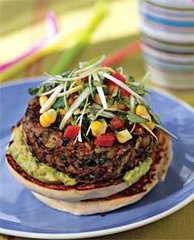My seven year old is a vegetarian. When she started her quest of avoiding meat we thought just cutting out meat itself would be enough, but it has become a journey of shocking, jaw-dropping discovery at just what contains ground-up animal parts. As a result, I am now a veggie. So I have gone from researching good recipes and nutritional information, which is essential for such a young vegetarian, to the family taking on a healthier, more compassionate outlook on life.
Wednesday, 11 April 2007
Labelling - don't believe everything you read....
I am surprised, actually, that it is only within the last year that rules have been introduced to regulate what labelling goes on our food. I had naively assumed that if it said ‘suitable for vegetarians’ then there wasn’t any meat product tucked away in there. Well, guidelines have been published by the Food Standards Agency, which will hopefully eliminate the confusion and improve food labelling for vegans and vegetarians.
The FSA said:
‘There has been a lot of confusion over the use of the terms vegetarian and vegan on food labels both in the retail and catering sectors.’
It was produced after consultation with stakeholders including The Vegetarian Society and The Vegan Society and provides criteria for the use of the terms vegetarian and vegan on food labels for the first time.
There are approximately 3.5 million vegetarians and 0.25 million vegans in the UK. The guidance should make it easier for these consumers to identify the products that are suitable for them.
It aims to improve consistency in the use of the terms on food labels by manufacturers and caterers and help enforcement agencies to identify misleading labelling.
The guidance should also help to prevent some common mistakes by companies such as labelling drink or food that has been derived from animal products or fish as suitable for 'vegans' and 'vegetarians'.
Dr Richard Harding, Head of the FSA’s Consumer Choice, Food Standards and Special Projects Division said: 'There has been a lot of confusion over the use of the terms "vegetarian" and "vegan" on food labels both in the retail and catering sectors.
The root cause of the problem seems to be the lack of agreed criteria. The guidance aims to improve consistency by providing criteria for the use of these terms in food labelling.'
Tina Fox, Chief Executive of The Vegetarian Society said: 'We all want to know what we are eating and misleading labelling makes it particularly difficult for Britain's three million plus vegetarians and vegans to make informed choices.
'In the continuing absence of a definition of these terms in law, The Vegetarian Society sincerely hopes that the FSA's guidance is widely taken up by manufacturers, caterers, retailers and local enforcement authorities.'
George Rodger, Chair of The Vegan Society said: 'As more and more foods have become available in packaged form, vegans have had to become accustomed to reading long lists of ingredients to see whether or not a product is suitable for them.
'The new food-labelling guidance from the Food Standards Agency will make things so much easier. If a product is labelled ‘suitable for vegans’ in accordance with this guidance, they need look no further.'
To see the article in full visit:
http://www.food.gov.uk/news/newsarchive/2006/apr/vegvegan
The FSA said:
‘There has been a lot of confusion over the use of the terms vegetarian and vegan on food labels both in the retail and catering sectors.’
It was produced after consultation with stakeholders including The Vegetarian Society and The Vegan Society and provides criteria for the use of the terms vegetarian and vegan on food labels for the first time.
There are approximately 3.5 million vegetarians and 0.25 million vegans in the UK. The guidance should make it easier for these consumers to identify the products that are suitable for them.
It aims to improve consistency in the use of the terms on food labels by manufacturers and caterers and help enforcement agencies to identify misleading labelling.
The guidance should also help to prevent some common mistakes by companies such as labelling drink or food that has been derived from animal products or fish as suitable for 'vegans' and 'vegetarians'.
Dr Richard Harding, Head of the FSA’s Consumer Choice, Food Standards and Special Projects Division said: 'There has been a lot of confusion over the use of the terms "vegetarian" and "vegan" on food labels both in the retail and catering sectors.
The root cause of the problem seems to be the lack of agreed criteria. The guidance aims to improve consistency by providing criteria for the use of these terms in food labelling.'
Tina Fox, Chief Executive of The Vegetarian Society said: 'We all want to know what we are eating and misleading labelling makes it particularly difficult for Britain's three million plus vegetarians and vegans to make informed choices.
'In the continuing absence of a definition of these terms in law, The Vegetarian Society sincerely hopes that the FSA's guidance is widely taken up by manufacturers, caterers, retailers and local enforcement authorities.'
George Rodger, Chair of The Vegan Society said: 'As more and more foods have become available in packaged form, vegans have had to become accustomed to reading long lists of ingredients to see whether or not a product is suitable for them.
'The new food-labelling guidance from the Food Standards Agency will make things so much easier. If a product is labelled ‘suitable for vegans’ in accordance with this guidance, they need look no further.'
To see the article in full visit:
http://www.food.gov.uk/news/newsarchive/2006/apr/vegvegan
Subscribe to:
Post Comments (Atom)
































No comments:
Post a Comment